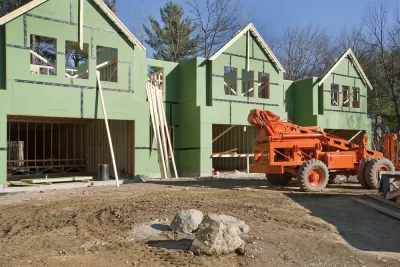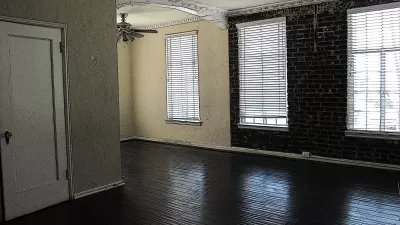An annual report from the Joint Center for Housing Studies (JCHS) reveals that a growing number of American households face housing insecurity and spiking costs of living.

Ahmad Abu-Khalaf reports on the latest The State of the Nation’s Housing report from Harvard’s Joint Center for Housing Studies (JCHS), which paints a grim picture of the U.S. housing market, particularly for renters and communities of color. “JCHS’ data show that in 2020, the nationwide share of cost-burdened households (those paying over 30 percent of their income for housing) rose 1.5 percentage points to nearly 30%; renters at all income levels are feeling the pinch, though Black households are disproportionately impacted.” In the first quarter of this year, rents rose by as much as 20 percent in some cities.
The report also highlights the rise in utility costs and the “historically low” availability of housing units, which put low-income households struggling to pay rent at even higher risk of eviction and displacement. The crisis is affecting greater numbers of middle-income earners, too: According to the report, “households earning between $30,000 and $45,000 saw the largest increase (4.2%) in the number of cost-burdened households.” Meanwhile, “The surge in the prices of gas, food, and other necessities has made matters worse, especially now that most emergency government supports have ended. The housing stock itself is in dire need of investment to meet the demands of a rapidly aging population and the threats posed by climate change.” The report recommends enhanced and continued federal rental assistance as one step to easing the crisis.
Other key findings:
- While homebuying accelerated, first-time buyers faced more obstacles, particularly after the hike in interest rates in the early part of 2022.
- Climate-induced disasters pose a growing risk to the stability of the housing market.
- Upgrades to existing housing stock are urgently needed to preserve older housing, meet accessibility needs, and improve energy efficiency.
The JCHS website includes the full report with many more insights, interactive maps, and detailed data sources. Read past Planetizen coverage of the report here.
FULL STORY: Four Key Findings From 2022 State of the Nation's Housing Report

Study: Maui’s Plan to Convert Vacation Rentals to Long-Term Housing Could Cause Nearly $1 Billion Economic Loss
The plan would reduce visitor accommodation by 25,% resulting in 1,900 jobs lost.

North Texas Transit Leaders Tout Benefits of TOD for Growing Region
At a summit focused on transit-oriented development, policymakers discussed how North Texas’ expanded light rail system can serve as a tool for economic growth.

Why Should We Subsidize Public Transportation?
Many public transit agencies face financial stress due to rising costs, declining fare revenue, and declining subsidies. Transit advocates must provide a strong business case for increasing public transit funding.

How to Make US Trains Faster
Changes to boarding platforms and a switch to electric trains could improve U.S. passenger rail service without the added cost of high-speed rail.

Columbia’s Revitalized ‘Loop’ Is a Hub for Local Entrepreneurs
A focus on small businesses is helping a commercial corridor in Columbia, Missouri thrive.

Invasive Insect Threatens Minnesota’s Ash Forests
The Emerald Ash Borer is a rapidly spreading invasive pest threatening Minnesota’s ash trees, and homeowners are encouraged to plant diverse replacement species, avoid moving ash firewood, and monitor for signs of infestation.
Urban Design for Planners 1: Software Tools
This six-course series explores essential urban design concepts using open source software and equips planners with the tools they need to participate fully in the urban design process.
Planning for Universal Design
Learn the tools for implementing Universal Design in planning regulations.
City of Santa Clarita
Ascent Environmental
Institute for Housing and Urban Development Studies (IHS)
City of Grandview
Harvard GSD Executive Education
Toledo-Lucas County Plan Commissions
Salt Lake City
NYU Wagner Graduate School of Public Service





























